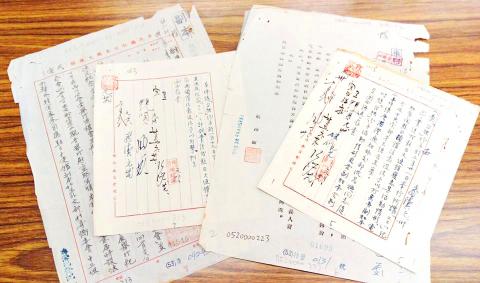The Executive Yuan yesterday finalized a draft political archives act to declassify political files held by government agencies, political parties and affiliates that have been classified for at least 30 years.
The draft act is to complement the Act on Promoting Transitional Justice (促進轉型正義條例), which was passed in December last year and was designed to facilitate efforts to uncover the truth about the nation’s authoritarian era and promote transitional justice.
The proposal specifies rules to cover the transfer of political data to the government, the uses of such data and the extent to which such data are to be disclosed.

Photo: Screengrab from President Tsai Ing-wen’s Facebook page
The National Development Council (NDC) would be in charge of collating, preserving and publicizing political files dating from Aug. 15, 1945, to Nov. 6, 1992, that are linked to the 228 Incident, the Martial Law era and the Period of National Mobilization against Communist Rebellion.
The draft states that political parties, their affiliates and businesses they operate that are in possession of political files determined by the Ill-gotten Party Assets Settlement Committee to be state-owned should transfer the files to the National Archives Administration (NAA) within a prescribed period.
Files deemed by the NAA to serve the educational, research or exhibition purposes are to be used by the Ministry of Culture and relevant agencies, the draft states.
The bill also stipulates that government agencies should identify all the political files in their possession and deliver them to the NAA within six months of the act’s promulgation. The time frame could be extended if agencies cannot fulfill the requirement, but not exceeding a year.
However, files at government agencies designated “permanently classified” under the Classified National Security Information Protection Act (國家機密保護法) would be exempted from being transferred to the NAA.
The NAA should regularly review which files should be made available to the public and files that have been classified for at least 30 years should be unconditionally declassified, it states.
People arrested, investigated, prosecuted, warranted, tried or penalized for being implicated in events documented in files would be able to view, copy or make photocopies of files related to themselves, or their survivors could exercise the right in their stead.
The bill also states that the real names of whistle-blowers, witnesses, sources and civil servants implicated in a political event are to be made available for public viewing alongside the codes, code names and pseudonyms assigned to them.
The Chinese Nationalist Party (KMT) criticized the bill, saying the legislation would become a weapon for the Democratic Progressive Party (DPP) to crucify the KMT, as it would give the DPP carte blanche to comb through the KMT’s archives.
However, NDC Deputy Minister Tseng Hsu-cheng (曾旭正) told a news conference at the Executive Yuan that the bill was not politically motivated.
The council had proposed the legislation to facilitate what it expected to be a lengthy task of collating such political files.

The CIA has a message for Chinese government officials worried about their place in Chinese President Xi Jinping’s (習近平) government: Come work with us. The agency released two Mandarin-language videos on social media on Thursday inviting disgruntled officials to contact the CIA. The recruitment videos posted on YouTube and X racked up more than 5 million views combined in their first day. The outreach comes as CIA Director John Ratcliffe has vowed to boost the agency’s use of intelligence from human sources and its focus on China, which has recently targeted US officials with its own espionage operations. The videos are “aimed at

STEADFAST FRIEND: The bills encourage increased Taiwan-US engagement and address China’s distortion of UN Resolution 2758 to isolate Taiwan internationally The Presidential Office yesterday thanked the US House of Representatives for unanimously passing two Taiwan-related bills highlighting its solid support for Taiwan’s democracy and global participation, and for deepening bilateral relations. One of the bills, the Taiwan Assurance Implementation Act, requires the US Department of State to periodically review its guidelines for engagement with Taiwan, and report to the US Congress on the guidelines and plans to lift self-imposed limitations on US-Taiwan engagement. The other bill is the Taiwan International Solidarity Act, which clarifies that UN Resolution 2758 does not address the issue of the representation of Taiwan or its people in

US Indo-Pacific Commander Admiral Samuel Paparo on Friday expressed concern over the rate at which China is diversifying its military exercises, the Financial Times (FT) reported on Saturday. “The rates of change on the depth and breadth of their exercises is the one non-linear effect that I’ve seen in the last year that wakes me up at night or keeps me up at night,” Paparo was quoted by FT as saying while attending the annual Sedona Forum at the McCain Institute in Arizona. Paparo also expressed concern over the speed with which China was expanding its military. While the US

SHIFT: Taiwan’s better-than-expected first-quarter GDP and signs of weakness in the US have driven global capital back to emerging markets, the central bank head said The central bank yesterday blamed market speculation for the steep rise in the local currency, and urged exporters and financial institutions to stay calm and stop panic sell-offs to avoid hurting their own profitability. The nation’s top monetary policymaker said that it would step in, if necessary, to maintain order and stability in the foreign exchange market. The remarks came as the NT dollar yesterday closed up NT$0.919 to NT$30.145 against the US dollar in Taipei trading, after rising as high as NT$29.59 in intraday trading. The local currency has surged 5.85 percent against the greenback over the past two sessions, central